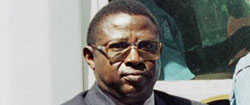Tribunal to rule on Rwanda genocide
Alleged architect of the 1994 mass killings appears before a UN-back court.

Prosecutors said Bagosora, formerly a cabinet director in the defence ministry, assumed control of military and political affairs in Rwanda after Juvenal Habyarimana, then Rwanda’s president, was killed when is plane was shot down.
The tribunal alleges that before the killings, Bagosora stormed out of peace talks in Tanzania saying he was returning to Rwanda to “prepare the apocalypse”.
Bagosora faces 11 charges of genocide, war crimes and crimes against humanity.
He has pleaded not guilty.
‘Monsieur Z’
Earlier the tribunal found Habyarimana’s brother-in-law Protais Zigiranyirazo, known as “Monsieur Z”, guilty of genocide and sentenced him to 55 years in prison.
| Theoneste Bagosora |
|
Born on August 16, 1941 in Rwanda’s Gisenyi prefecture, the region home to many of the country’s former Hutu elite. Graduated as an officer in 1964 and later went for advanced military studies at a French staff college. He retired from the army in 1993 but remained at his post in the defence ministry. After the genocide, Bagosora fled into exile in Cameroon where he was arrested in 1996. His trial began in 2002. Romeo Dallaire, who led UN peacekeepers during the Rwanda genocide, described Bagosora as the “kingpin” behind the killings and said that the colonel had threatened to kill him with a pistol. |
Zigiranyirazo was accused of being a member of the Akazu, the ruling elite of Hutu family members and relatives who are believed to have plotted to exterminate the minority Tutsis.
He was said to have been a member of the notorious Zero Network of death squads which killed hundreds of Tutsis and opposition leaders in the years leading up to the genocide.
Prosecutors said Zigiranyirazo sanctioned roadblocks to be set up near his three residences and paid for a mass grave to be dug outside his compound to bury those killed.
Zigiranyirazo was also said to have armed, trained and clothed the Interahamwe fighters who conducted most of the killings.
Since it began work in 1997, the court has delivered 34 judgements. Five of them were acquittals.
If Bagosora is convicted, it will mark the first time the tribunal has sentenced any suspect for having actually conspired to carry out the genocide.
The court has until the end of the year to wind up its activities and until 2010 to hear all appeals.
The UN General Assembly is discussing whether to extend the court’s mandate.
